International Trade Finance and Investment: Schroders Plc Report
VerifiedAdded on 2023/01/04
|12
|4169
|7
Report
AI Summary
This report provides an in-depth analysis of international trade finance and investment, with a specific focus on the UK economy and Schroders Plc. It begins with an introduction to international trade and its significance, followed by an overview of financial markets and capital allocation within both domestic and international contexts. The report examines the UK's financial market, capital allocation strategies for small businesses, infrastructure development, and funding of corporations. Furthermore, it explores capital allocation in international markets, including organic growth investments, imports, and mergers and acquisitions. An evaluation of the US economy is also included. The report concludes with a critical assessment of the challenges faced by the UK due to industrialization and trade policies, offering a comprehensive understanding of the complexities within international trade finance.
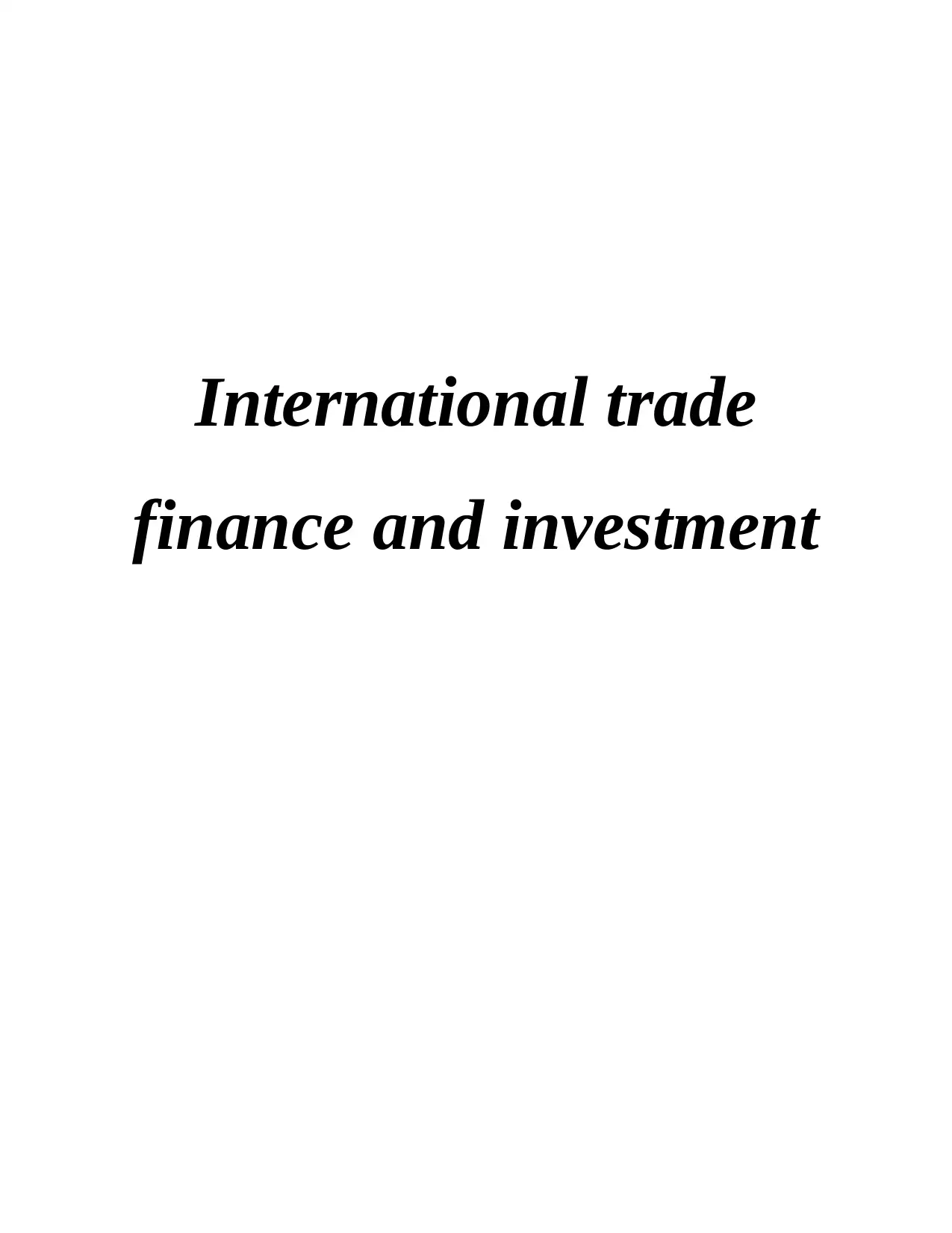
International trade
finance and investment
finance and investment
Paraphrase This Document
Need a fresh take? Get an instant paraphrase of this document with our AI Paraphraser
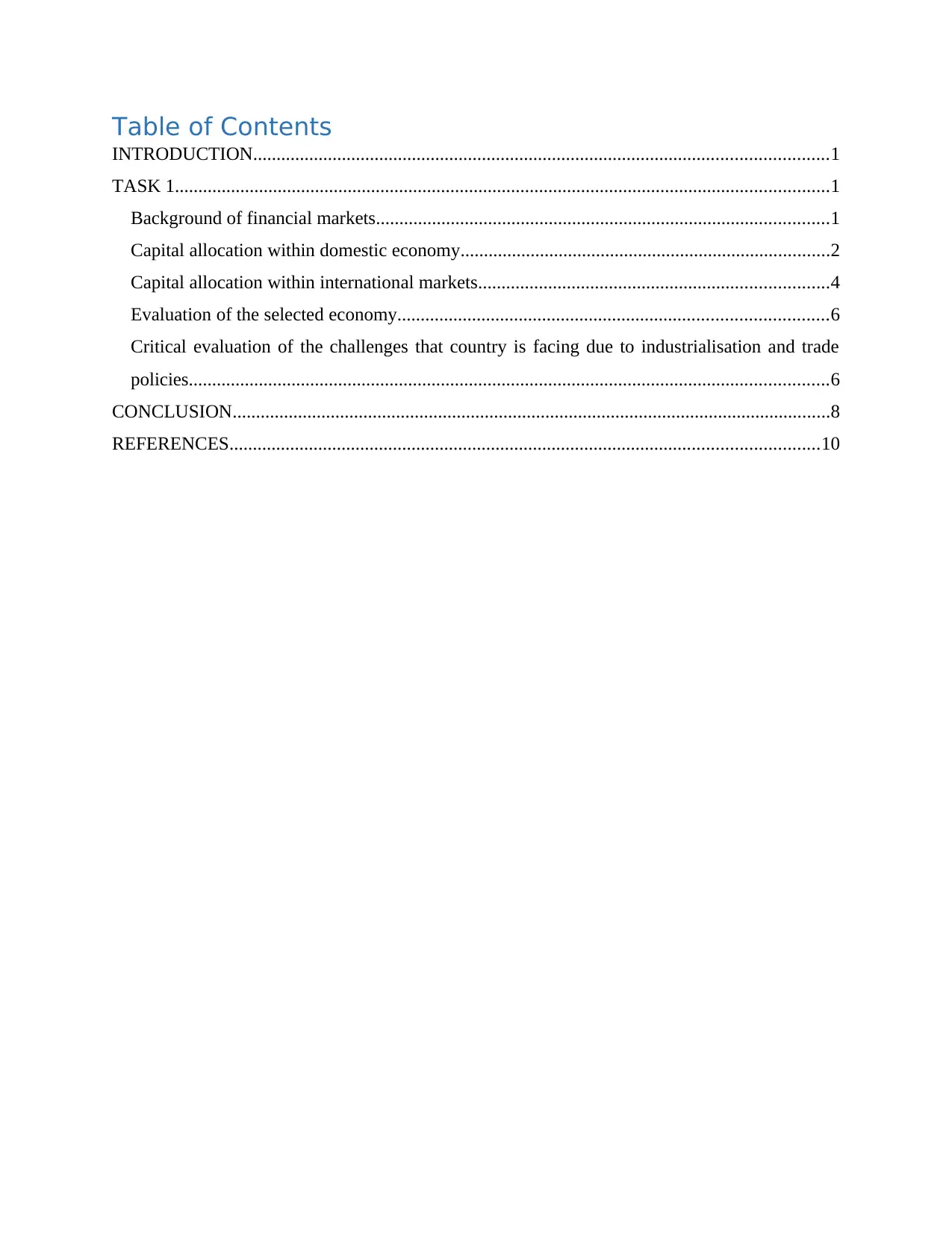
Table of Contents
INTRODUCTION...........................................................................................................................1
TASK 1............................................................................................................................................1
Background of financial markets.................................................................................................1
Capital allocation within domestic economy...............................................................................2
Capital allocation within international markets...........................................................................4
Evaluation of the selected economy............................................................................................6
Critical evaluation of the challenges that country is facing due to industrialisation and trade
policies.........................................................................................................................................6
CONCLUSION................................................................................................................................8
REFERENCES..............................................................................................................................10
INTRODUCTION...........................................................................................................................1
TASK 1............................................................................................................................................1
Background of financial markets.................................................................................................1
Capital allocation within domestic economy...............................................................................2
Capital allocation within international markets...........................................................................4
Evaluation of the selected economy............................................................................................6
Critical evaluation of the challenges that country is facing due to industrialisation and trade
policies.........................................................................................................................................6
CONCLUSION................................................................................................................................8
REFERENCES..............................................................................................................................10
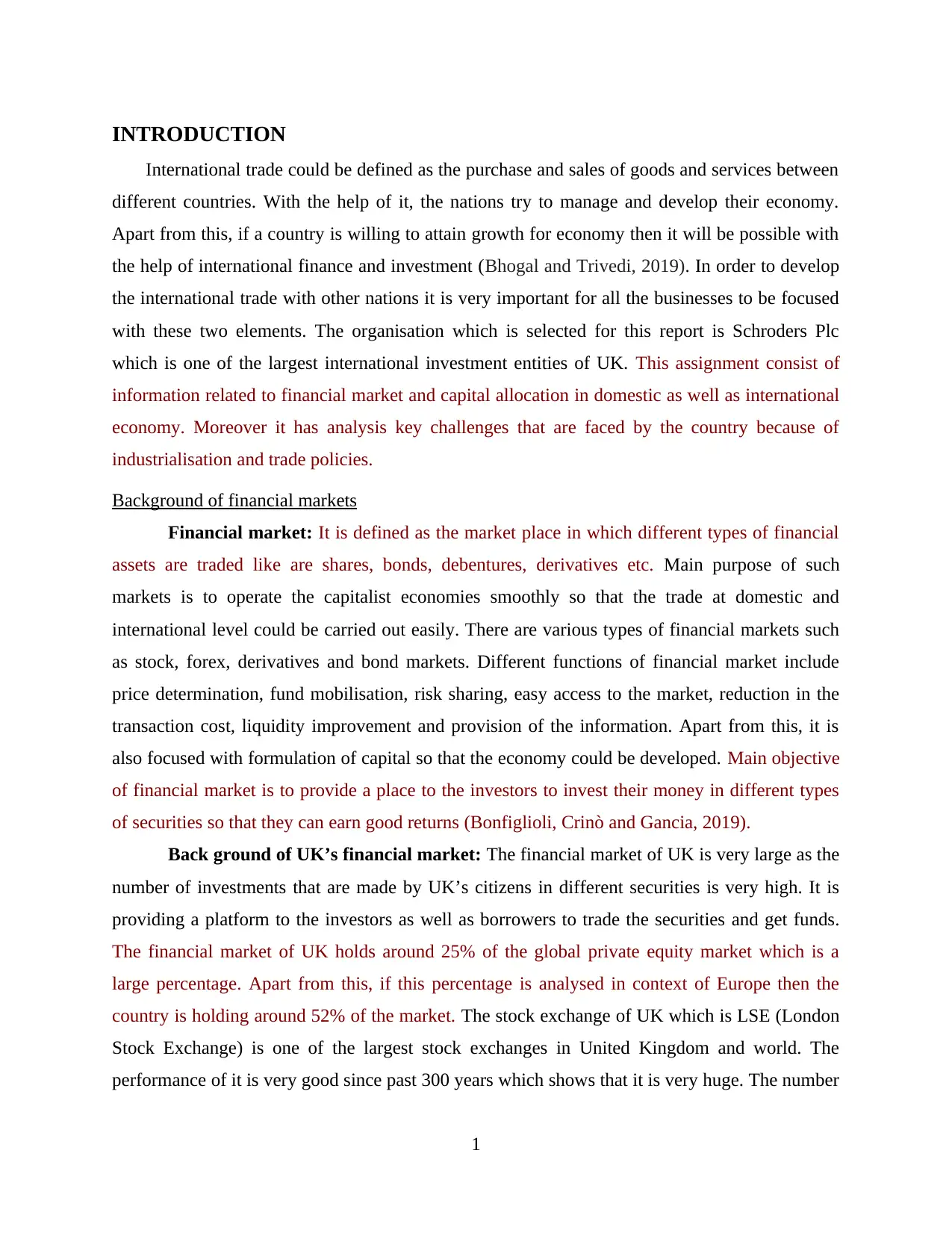
INTRODUCTION
International trade could be defined as the purchase and sales of goods and services between
different countries. With the help of it, the nations try to manage and develop their economy.
Apart from this, if a country is willing to attain growth for economy then it will be possible with
the help of international finance and investment (Bhogal and Trivedi, 2019). In order to develop
the international trade with other nations it is very important for all the businesses to be focused
with these two elements. The organisation which is selected for this report is Schroders Plc
which is one of the largest international investment entities of UK. This assignment consist of
information related to financial market and capital allocation in domestic as well as international
economy. Moreover it has analysis key challenges that are faced by the country because of
industrialisation and trade policies.
Background of financial markets
Financial market: It is defined as the market place in which different types of financial
assets are traded like are shares, bonds, debentures, derivatives etc. Main purpose of such
markets is to operate the capitalist economies smoothly so that the trade at domestic and
international level could be carried out easily. There are various types of financial markets such
as stock, forex, derivatives and bond markets. Different functions of financial market include
price determination, fund mobilisation, risk sharing, easy access to the market, reduction in the
transaction cost, liquidity improvement and provision of the information. Apart from this, it is
also focused with formulation of capital so that the economy could be developed. Main objective
of financial market is to provide a place to the investors to invest their money in different types
of securities so that they can earn good returns (Bonfiglioli, Crinò and Gancia, 2019).
Back ground of UK’s financial market: The financial market of UK is very large as the
number of investments that are made by UK’s citizens in different securities is very high. It is
providing a platform to the investors as well as borrowers to trade the securities and get funds.
The financial market of UK holds around 25% of the global private equity market which is a
large percentage. Apart from this, if this percentage is analysed in context of Europe then the
country is holding around 52% of the market. The stock exchange of UK which is LSE (London
Stock Exchange) is one of the largest stock exchanges in United Kingdom and world. The
performance of it is very good since past 300 years which shows that it is very huge. The number
1
International trade could be defined as the purchase and sales of goods and services between
different countries. With the help of it, the nations try to manage and develop their economy.
Apart from this, if a country is willing to attain growth for economy then it will be possible with
the help of international finance and investment (Bhogal and Trivedi, 2019). In order to develop
the international trade with other nations it is very important for all the businesses to be focused
with these two elements. The organisation which is selected for this report is Schroders Plc
which is one of the largest international investment entities of UK. This assignment consist of
information related to financial market and capital allocation in domestic as well as international
economy. Moreover it has analysis key challenges that are faced by the country because of
industrialisation and trade policies.
Background of financial markets
Financial market: It is defined as the market place in which different types of financial
assets are traded like are shares, bonds, debentures, derivatives etc. Main purpose of such
markets is to operate the capitalist economies smoothly so that the trade at domestic and
international level could be carried out easily. There are various types of financial markets such
as stock, forex, derivatives and bond markets. Different functions of financial market include
price determination, fund mobilisation, risk sharing, easy access to the market, reduction in the
transaction cost, liquidity improvement and provision of the information. Apart from this, it is
also focused with formulation of capital so that the economy could be developed. Main objective
of financial market is to provide a place to the investors to invest their money in different types
of securities so that they can earn good returns (Bonfiglioli, Crinò and Gancia, 2019).
Back ground of UK’s financial market: The financial market of UK is very large as the
number of investments that are made by UK’s citizens in different securities is very high. It is
providing a platform to the investors as well as borrowers to trade the securities and get funds.
The financial market of UK holds around 25% of the global private equity market which is a
large percentage. Apart from this, if this percentage is analysed in context of Europe then the
country is holding around 52% of the market. The stock exchange of UK which is LSE (London
Stock Exchange) is one of the largest stock exchanges in United Kingdom and world. The
performance of it is very good since past 300 years which shows that it is very huge. The number
1
⊘ This is a preview!⊘
Do you want full access?
Subscribe today to unlock all pages.

Trusted by 1+ million students worldwide
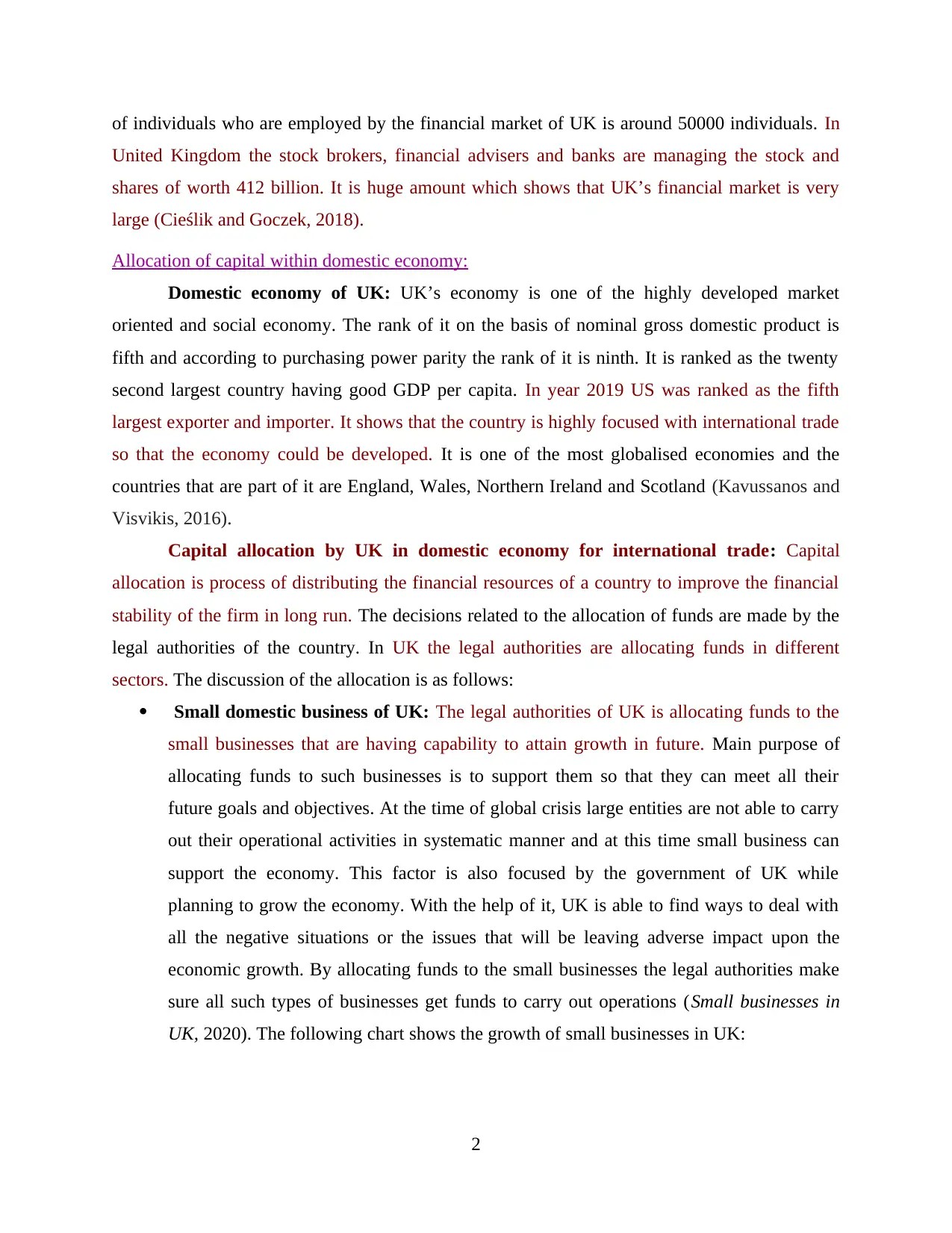
of individuals who are employed by the financial market of UK is around 50000 individuals. In
United Kingdom the stock brokers, financial advisers and banks are managing the stock and
shares of worth 412 billion. It is huge amount which shows that UK’s financial market is very
large (Cieślik and Goczek, 2018).
Allocation of capital within domestic economy:
Domestic economy of UK: UK’s economy is one of the highly developed market
oriented and social economy. The rank of it on the basis of nominal gross domestic product is
fifth and according to purchasing power parity the rank of it is ninth. It is ranked as the twenty
second largest country having good GDP per capita. In year 2019 US was ranked as the fifth
largest exporter and importer. It shows that the country is highly focused with international trade
so that the economy could be developed. It is one of the most globalised economies and the
countries that are part of it are England, Wales, Northern Ireland and Scotland (Kavussanos and
Visvikis, 2016).
Capital allocation by UK in domestic economy for international trade: Capital
allocation is process of distributing the financial resources of a country to improve the financial
stability of the firm in long run. The decisions related to the allocation of funds are made by the
legal authorities of the country. In UK the legal authorities are allocating funds in different
sectors. The discussion of the allocation is as follows:
Small domestic business of UK: The legal authorities of UK is allocating funds to the
small businesses that are having capability to attain growth in future. Main purpose of
allocating funds to such businesses is to support them so that they can meet all their
future goals and objectives. At the time of global crisis large entities are not able to carry
out their operational activities in systematic manner and at this time small business can
support the economy. This factor is also focused by the government of UK while
planning to grow the economy. With the help of it, UK is able to find ways to deal with
all the negative situations or the issues that will be leaving adverse impact upon the
economic growth. By allocating funds to the small businesses the legal authorities make
sure all such types of businesses get funds to carry out operations (Small businesses in
UK, 2020). The following chart shows the growth of small businesses in UK:
2
United Kingdom the stock brokers, financial advisers and banks are managing the stock and
shares of worth 412 billion. It is huge amount which shows that UK’s financial market is very
large (Cieślik and Goczek, 2018).
Allocation of capital within domestic economy:
Domestic economy of UK: UK’s economy is one of the highly developed market
oriented and social economy. The rank of it on the basis of nominal gross domestic product is
fifth and according to purchasing power parity the rank of it is ninth. It is ranked as the twenty
second largest country having good GDP per capita. In year 2019 US was ranked as the fifth
largest exporter and importer. It shows that the country is highly focused with international trade
so that the economy could be developed. It is one of the most globalised economies and the
countries that are part of it are England, Wales, Northern Ireland and Scotland (Kavussanos and
Visvikis, 2016).
Capital allocation by UK in domestic economy for international trade: Capital
allocation is process of distributing the financial resources of a country to improve the financial
stability of the firm in long run. The decisions related to the allocation of funds are made by the
legal authorities of the country. In UK the legal authorities are allocating funds in different
sectors. The discussion of the allocation is as follows:
Small domestic business of UK: The legal authorities of UK is allocating funds to the
small businesses that are having capability to attain growth in future. Main purpose of
allocating funds to such businesses is to support them so that they can meet all their
future goals and objectives. At the time of global crisis large entities are not able to carry
out their operational activities in systematic manner and at this time small business can
support the economy. This factor is also focused by the government of UK while
planning to grow the economy. With the help of it, UK is able to find ways to deal with
all the negative situations or the issues that will be leaving adverse impact upon the
economic growth. By allocating funds to the small businesses the legal authorities make
sure all such types of businesses get funds to carry out operations (Small businesses in
UK, 2020). The following chart shows the growth of small businesses in UK:
2
Paraphrase This Document
Need a fresh take? Get an instant paraphrase of this document with our AI Paraphraser
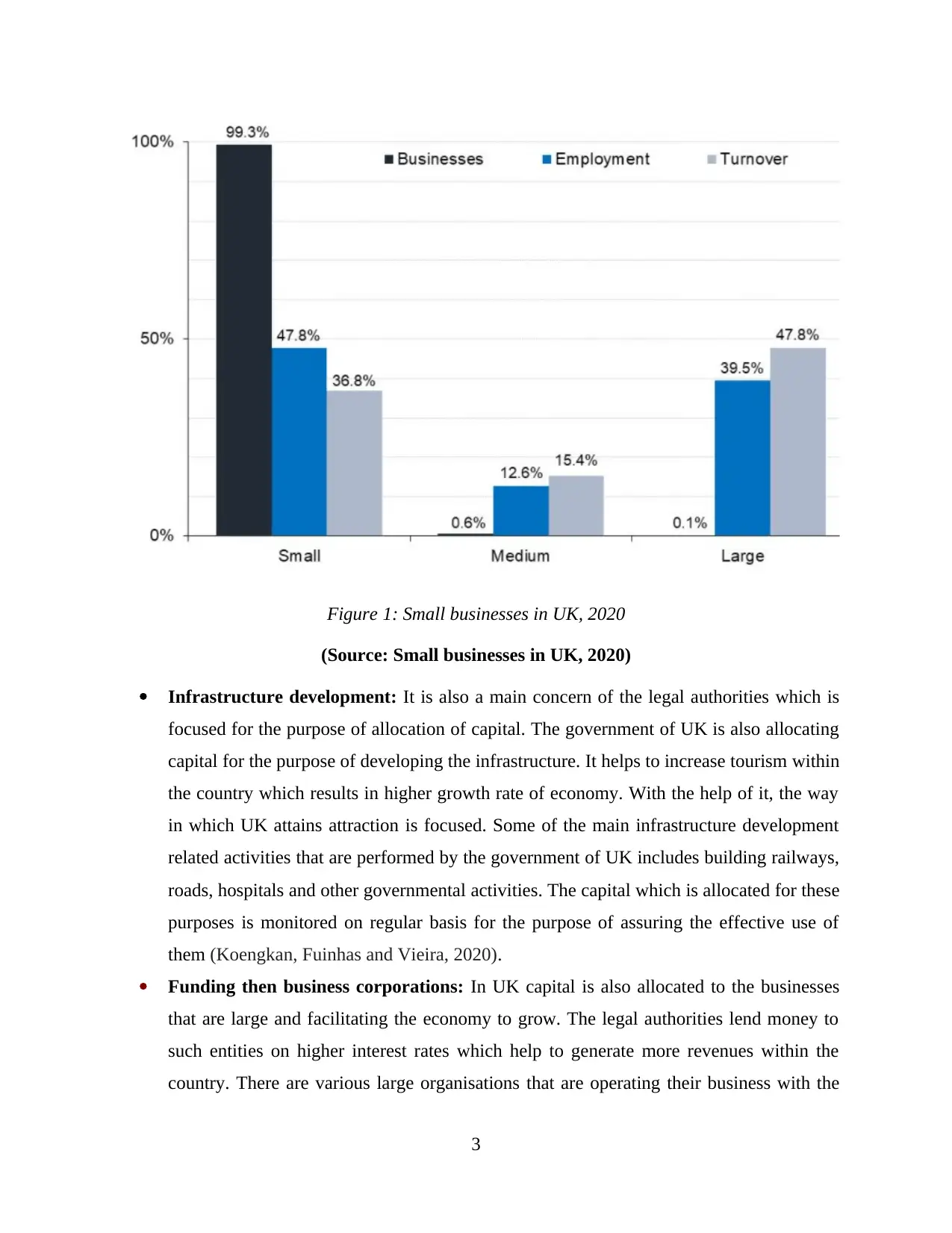
Figure 1: Small businesses in UK, 2020
(Source: Small businesses in UK, 2020)
Infrastructure development: It is also a main concern of the legal authorities which is
focused for the purpose of allocation of capital. The government of UK is also allocating
capital for the purpose of developing the infrastructure. It helps to increase tourism within
the country which results in higher growth rate of economy. With the help of it, the way
in which UK attains attraction is focused. Some of the main infrastructure development
related activities that are performed by the government of UK includes building railways,
roads, hospitals and other governmental activities. The capital which is allocated for these
purposes is monitored on regular basis for the purpose of assuring the effective use of
them (Koengkan, Fuinhas and Vieira, 2020).
Funding then business corporations: In UK capital is also allocated to the businesses
that are large and facilitating the economy to grow. The legal authorities lend money to
such entities on higher interest rates which help to generate more revenues within the
country. There are various large organisations that are operating their business with the
3
(Source: Small businesses in UK, 2020)
Infrastructure development: It is also a main concern of the legal authorities which is
focused for the purpose of allocation of capital. The government of UK is also allocating
capital for the purpose of developing the infrastructure. It helps to increase tourism within
the country which results in higher growth rate of economy. With the help of it, the way
in which UK attains attraction is focused. Some of the main infrastructure development
related activities that are performed by the government of UK includes building railways,
roads, hospitals and other governmental activities. The capital which is allocated for these
purposes is monitored on regular basis for the purpose of assuring the effective use of
them (Koengkan, Fuinhas and Vieira, 2020).
Funding then business corporations: In UK capital is also allocated to the businesses
that are large and facilitating the economy to grow. The legal authorities lend money to
such entities on higher interest rates which help to generate more revenues within the
country. There are various large organisations that are operating their business with the
3
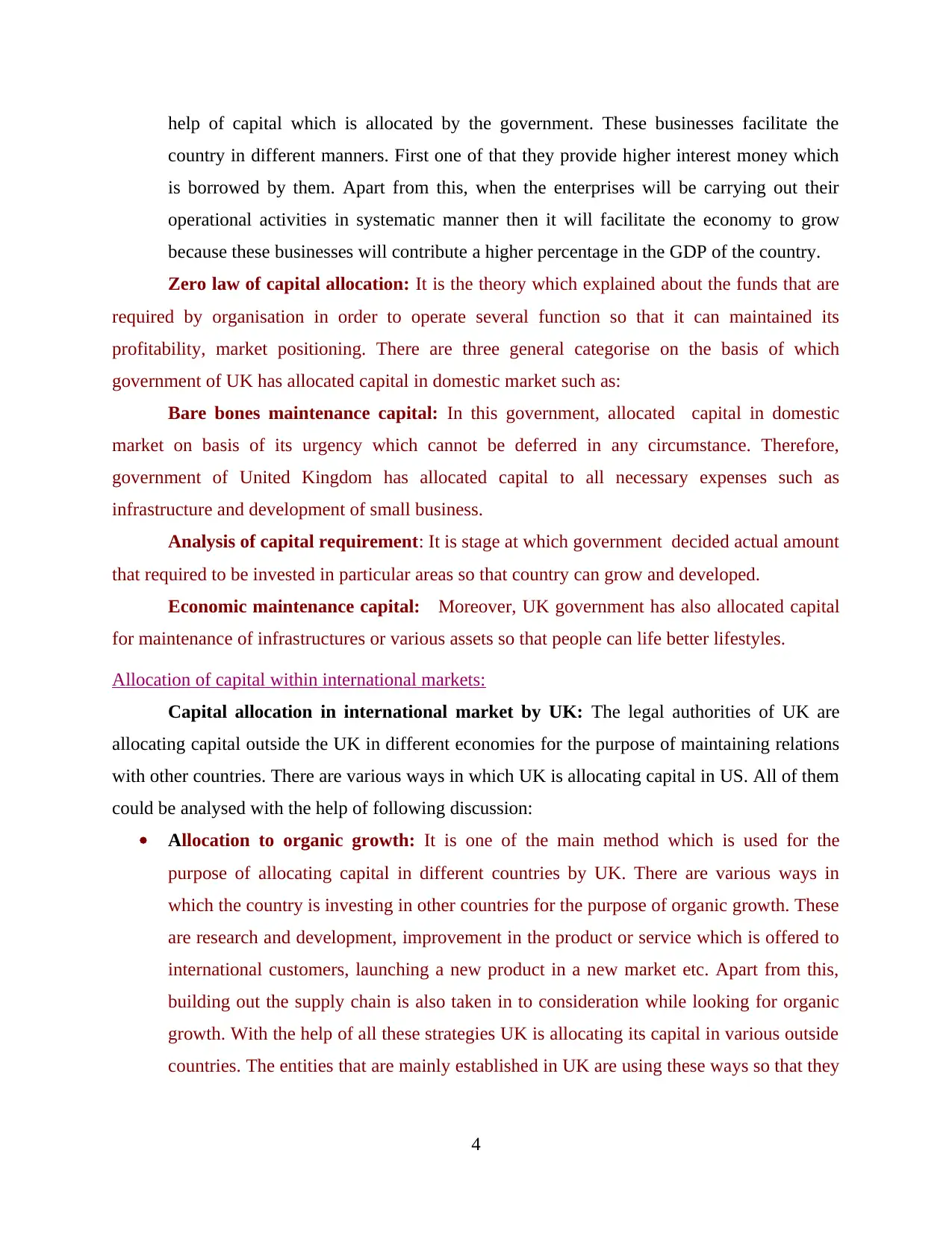
help of capital which is allocated by the government. These businesses facilitate the
country in different manners. First one of that they provide higher interest money which
is borrowed by them. Apart from this, when the enterprises will be carrying out their
operational activities in systematic manner then it will facilitate the economy to grow
because these businesses will contribute a higher percentage in the GDP of the country.
Zero law of capital allocation: It is the theory which explained about the funds that are
required by organisation in order to operate several function so that it can maintained its
profitability, market positioning. There are three general categorise on the basis of which
government of UK has allocated capital in domestic market such as:
Bare bones maintenance capital: In this government, allocated capital in domestic
market on basis of its urgency which cannot be deferred in any circumstance. Therefore,
government of United Kingdom has allocated capital to all necessary expenses such as
infrastructure and development of small business.
Analysis of capital requirement: It is stage at which government decided actual amount
that required to be invested in particular areas so that country can grow and developed.
Economic maintenance capital: Moreover, UK government has also allocated capital
for maintenance of infrastructures or various assets so that people can life better lifestyles.
Allocation of capital within international markets:
Capital allocation in international market by UK: The legal authorities of UK are
allocating capital outside the UK in different economies for the purpose of maintaining relations
with other countries. There are various ways in which UK is allocating capital in US. All of them
could be analysed with the help of following discussion:
Allocation to organic growth: It is one of the main method which is used for the
purpose of allocating capital in different countries by UK. There are various ways in
which the country is investing in other countries for the purpose of organic growth. These
are research and development, improvement in the product or service which is offered to
international customers, launching a new product in a new market etc. Apart from this,
building out the supply chain is also taken in to consideration while looking for organic
growth. With the help of all these strategies UK is allocating its capital in various outside
countries. The entities that are mainly established in UK are using these ways so that they
4
country in different manners. First one of that they provide higher interest money which
is borrowed by them. Apart from this, when the enterprises will be carrying out their
operational activities in systematic manner then it will facilitate the economy to grow
because these businesses will contribute a higher percentage in the GDP of the country.
Zero law of capital allocation: It is the theory which explained about the funds that are
required by organisation in order to operate several function so that it can maintained its
profitability, market positioning. There are three general categorise on the basis of which
government of UK has allocated capital in domestic market such as:
Bare bones maintenance capital: In this government, allocated capital in domestic
market on basis of its urgency which cannot be deferred in any circumstance. Therefore,
government of United Kingdom has allocated capital to all necessary expenses such as
infrastructure and development of small business.
Analysis of capital requirement: It is stage at which government decided actual amount
that required to be invested in particular areas so that country can grow and developed.
Economic maintenance capital: Moreover, UK government has also allocated capital
for maintenance of infrastructures or various assets so that people can life better lifestyles.
Allocation of capital within international markets:
Capital allocation in international market by UK: The legal authorities of UK are
allocating capital outside the UK in different economies for the purpose of maintaining relations
with other countries. There are various ways in which UK is allocating capital in US. All of them
could be analysed with the help of following discussion:
Allocation to organic growth: It is one of the main method which is used for the
purpose of allocating capital in different countries by UK. There are various ways in
which the country is investing in other countries for the purpose of organic growth. These
are research and development, improvement in the product or service which is offered to
international customers, launching a new product in a new market etc. Apart from this,
building out the supply chain is also taken in to consideration while looking for organic
growth. With the help of all these strategies UK is allocating its capital in various outside
countries. The entities that are mainly established in UK are using these ways so that they
4
⊘ This is a preview!⊘
Do you want full access?
Subscribe today to unlock all pages.

Trusted by 1+ million students worldwide
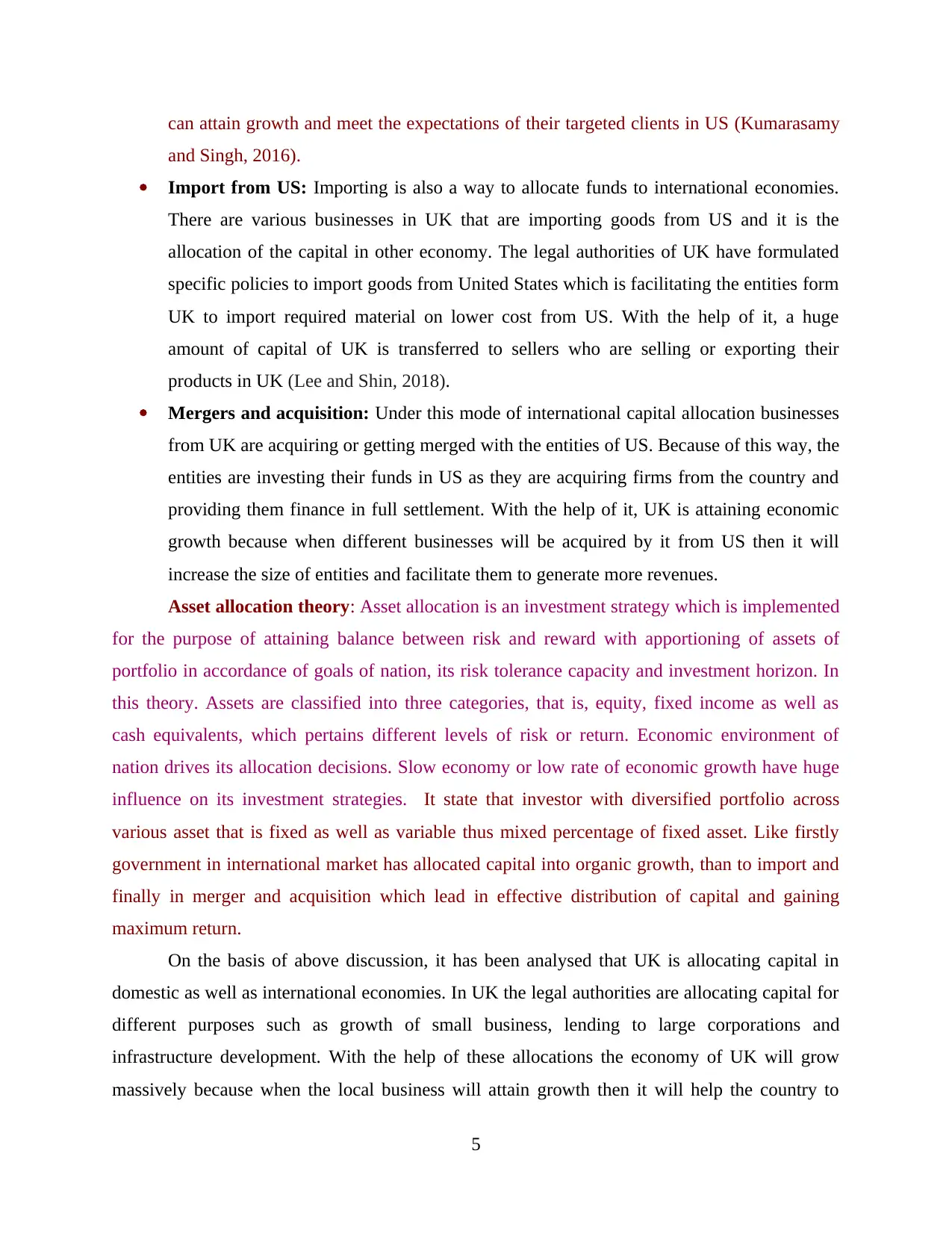
can attain growth and meet the expectations of their targeted clients in US (Kumarasamy
and Singh, 2016).
Import from US: Importing is also a way to allocate funds to international economies.
There are various businesses in UK that are importing goods from US and it is the
allocation of the capital in other economy. The legal authorities of UK have formulated
specific policies to import goods from United States which is facilitating the entities form
UK to import required material on lower cost from US. With the help of it, a huge
amount of capital of UK is transferred to sellers who are selling or exporting their
products in UK (Lee and Shin, 2018).
Mergers and acquisition: Under this mode of international capital allocation businesses
from UK are acquiring or getting merged with the entities of US. Because of this way, the
entities are investing their funds in US as they are acquiring firms from the country and
providing them finance in full settlement. With the help of it, UK is attaining economic
growth because when different businesses will be acquired by it from US then it will
increase the size of entities and facilitate them to generate more revenues.
Asset allocation theory: Asset allocation is an investment strategy which is implemented
for the purpose of attaining balance between risk and reward with apportioning of assets of
portfolio in accordance of goals of nation, its risk tolerance capacity and investment horizon. In
this theory. Assets are classified into three categories, that is, equity, fixed income as well as
cash equivalents, which pertains different levels of risk or return. Economic environment of
nation drives its allocation decisions. Slow economy or low rate of economic growth have huge
influence on its investment strategies. It state that investor with diversified portfolio across
various asset that is fixed as well as variable thus mixed percentage of fixed asset. Like firstly
government in international market has allocated capital into organic growth, than to import and
finally in merger and acquisition which lead in effective distribution of capital and gaining
maximum return.
On the basis of above discussion, it has been analysed that UK is allocating capital in
domestic as well as international economies. In UK the legal authorities are allocating capital for
different purposes such as growth of small business, lending to large corporations and
infrastructure development. With the help of these allocations the economy of UK will grow
massively because when the local business will attain growth then it will help the country to
5
and Singh, 2016).
Import from US: Importing is also a way to allocate funds to international economies.
There are various businesses in UK that are importing goods from US and it is the
allocation of the capital in other economy. The legal authorities of UK have formulated
specific policies to import goods from United States which is facilitating the entities form
UK to import required material on lower cost from US. With the help of it, a huge
amount of capital of UK is transferred to sellers who are selling or exporting their
products in UK (Lee and Shin, 2018).
Mergers and acquisition: Under this mode of international capital allocation businesses
from UK are acquiring or getting merged with the entities of US. Because of this way, the
entities are investing their funds in US as they are acquiring firms from the country and
providing them finance in full settlement. With the help of it, UK is attaining economic
growth because when different businesses will be acquired by it from US then it will
increase the size of entities and facilitate them to generate more revenues.
Asset allocation theory: Asset allocation is an investment strategy which is implemented
for the purpose of attaining balance between risk and reward with apportioning of assets of
portfolio in accordance of goals of nation, its risk tolerance capacity and investment horizon. In
this theory. Assets are classified into three categories, that is, equity, fixed income as well as
cash equivalents, which pertains different levels of risk or return. Economic environment of
nation drives its allocation decisions. Slow economy or low rate of economic growth have huge
influence on its investment strategies. It state that investor with diversified portfolio across
various asset that is fixed as well as variable thus mixed percentage of fixed asset. Like firstly
government in international market has allocated capital into organic growth, than to import and
finally in merger and acquisition which lead in effective distribution of capital and gaining
maximum return.
On the basis of above discussion, it has been analysed that UK is allocating capital in
domestic as well as international economies. In UK the legal authorities are allocating capital for
different purposes such as growth of small business, lending to large corporations and
infrastructure development. With the help of these allocations the economy of UK will grow
massively because when the local business will attain growth then it will help the country to
5
Paraphrase This Document
Need a fresh take? Get an instant paraphrase of this document with our AI Paraphraser
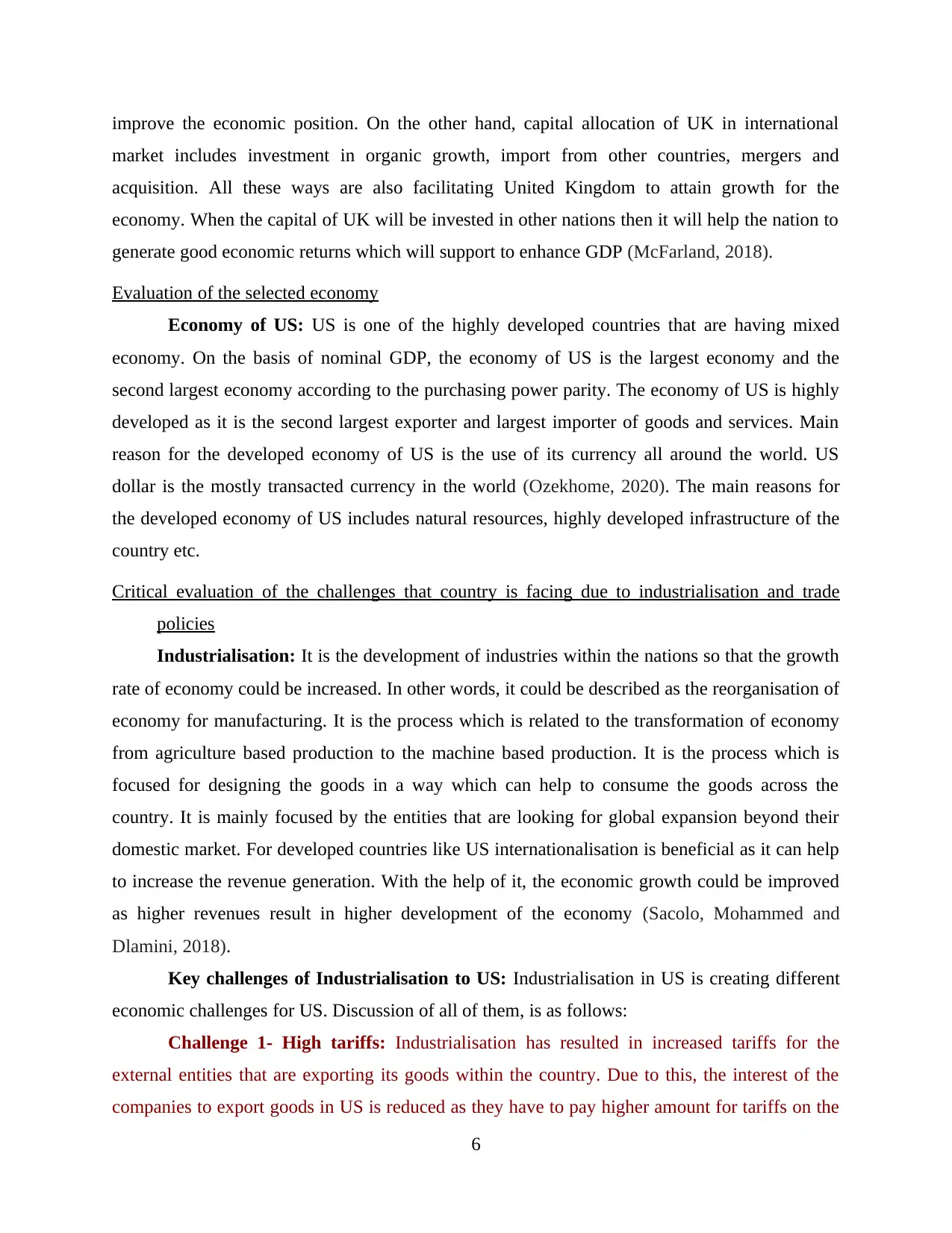
improve the economic position. On the other hand, capital allocation of UK in international
market includes investment in organic growth, import from other countries, mergers and
acquisition. All these ways are also facilitating United Kingdom to attain growth for the
economy. When the capital of UK will be invested in other nations then it will help the nation to
generate good economic returns which will support to enhance GDP (McFarland, 2018).
Evaluation of the selected economy
Economy of US: US is one of the highly developed countries that are having mixed
economy. On the basis of nominal GDP, the economy of US is the largest economy and the
second largest economy according to the purchasing power parity. The economy of US is highly
developed as it is the second largest exporter and largest importer of goods and services. Main
reason for the developed economy of US is the use of its currency all around the world. US
dollar is the mostly transacted currency in the world (Ozekhome, 2020). The main reasons for
the developed economy of US includes natural resources, highly developed infrastructure of the
country etc.
Critical evaluation of the challenges that country is facing due to industrialisation and trade
policies
Industrialisation: It is the development of industries within the nations so that the growth
rate of economy could be increased. In other words, it could be described as the reorganisation of
economy for manufacturing. It is the process which is related to the transformation of economy
from agriculture based production to the machine based production. It is the process which is
focused for designing the goods in a way which can help to consume the goods across the
country. It is mainly focused by the entities that are looking for global expansion beyond their
domestic market. For developed countries like US internationalisation is beneficial as it can help
to increase the revenue generation. With the help of it, the economic growth could be improved
as higher revenues result in higher development of the economy (Sacolo, Mohammed and
Dlamini, 2018).
Key challenges of Industrialisation to US: Industrialisation in US is creating different
economic challenges for US. Discussion of all of them, is as follows:
Challenge 1- High tariffs: Industrialisation has resulted in increased tariffs for the
external entities that are exporting its goods within the country. Due to this, the interest of the
companies to export goods in US is reduced as they have to pay higher amount for tariffs on the
6
market includes investment in organic growth, import from other countries, mergers and
acquisition. All these ways are also facilitating United Kingdom to attain growth for the
economy. When the capital of UK will be invested in other nations then it will help the nation to
generate good economic returns which will support to enhance GDP (McFarland, 2018).
Evaluation of the selected economy
Economy of US: US is one of the highly developed countries that are having mixed
economy. On the basis of nominal GDP, the economy of US is the largest economy and the
second largest economy according to the purchasing power parity. The economy of US is highly
developed as it is the second largest exporter and largest importer of goods and services. Main
reason for the developed economy of US is the use of its currency all around the world. US
dollar is the mostly transacted currency in the world (Ozekhome, 2020). The main reasons for
the developed economy of US includes natural resources, highly developed infrastructure of the
country etc.
Critical evaluation of the challenges that country is facing due to industrialisation and trade
policies
Industrialisation: It is the development of industries within the nations so that the growth
rate of economy could be increased. In other words, it could be described as the reorganisation of
economy for manufacturing. It is the process which is related to the transformation of economy
from agriculture based production to the machine based production. It is the process which is
focused for designing the goods in a way which can help to consume the goods across the
country. It is mainly focused by the entities that are looking for global expansion beyond their
domestic market. For developed countries like US internationalisation is beneficial as it can help
to increase the revenue generation. With the help of it, the economic growth could be improved
as higher revenues result in higher development of the economy (Sacolo, Mohammed and
Dlamini, 2018).
Key challenges of Industrialisation to US: Industrialisation in US is creating different
economic challenges for US. Discussion of all of them, is as follows:
Challenge 1- High tariffs: Industrialisation has resulted in increased tariffs for the
external entities that are exporting its goods within the country. Due to this, the interest of the
companies to export goods in US is reduced as they have to pay higher amount for tariffs on the
6
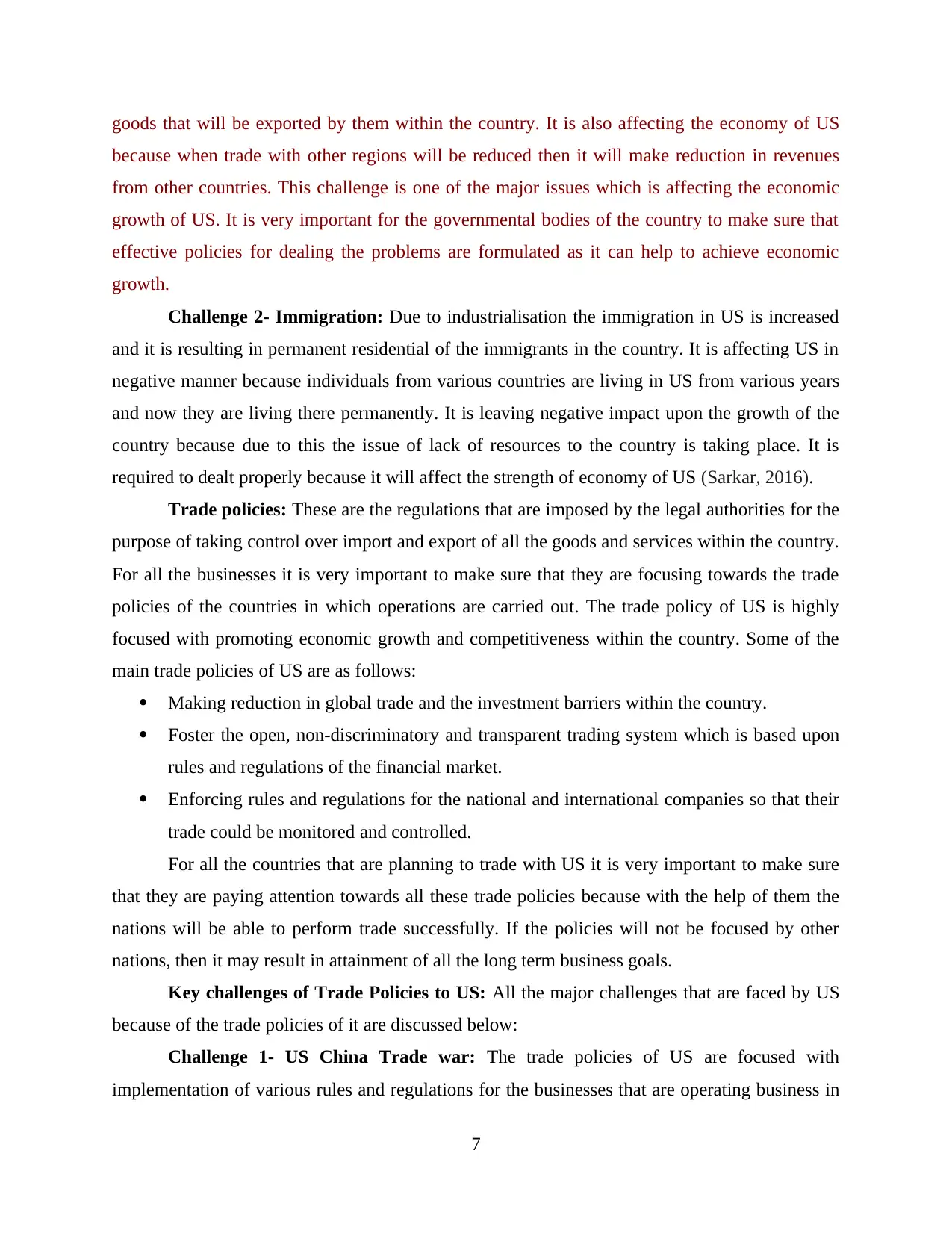
goods that will be exported by them within the country. It is also affecting the economy of US
because when trade with other regions will be reduced then it will make reduction in revenues
from other countries. This challenge is one of the major issues which is affecting the economic
growth of US. It is very important for the governmental bodies of the country to make sure that
effective policies for dealing the problems are formulated as it can help to achieve economic
growth.
Challenge 2- Immigration: Due to industrialisation the immigration in US is increased
and it is resulting in permanent residential of the immigrants in the country. It is affecting US in
negative manner because individuals from various countries are living in US from various years
and now they are living there permanently. It is leaving negative impact upon the growth of the
country because due to this the issue of lack of resources to the country is taking place. It is
required to dealt properly because it will affect the strength of economy of US (Sarkar, 2016).
Trade policies: These are the regulations that are imposed by the legal authorities for the
purpose of taking control over import and export of all the goods and services within the country.
For all the businesses it is very important to make sure that they are focusing towards the trade
policies of the countries in which operations are carried out. The trade policy of US is highly
focused with promoting economic growth and competitiveness within the country. Some of the
main trade policies of US are as follows:
Making reduction in global trade and the investment barriers within the country.
Foster the open, non-discriminatory and transparent trading system which is based upon
rules and regulations of the financial market.
Enforcing rules and regulations for the national and international companies so that their
trade could be monitored and controlled.
For all the countries that are planning to trade with US it is very important to make sure
that they are paying attention towards all these trade policies because with the help of them the
nations will be able to perform trade successfully. If the policies will not be focused by other
nations, then it may result in attainment of all the long term business goals.
Key challenges of Trade Policies to US: All the major challenges that are faced by US
because of the trade policies of it are discussed below:
Challenge 1- US China Trade war: The trade policies of US are focused with
implementation of various rules and regulations for the businesses that are operating business in
7
because when trade with other regions will be reduced then it will make reduction in revenues
from other countries. This challenge is one of the major issues which is affecting the economic
growth of US. It is very important for the governmental bodies of the country to make sure that
effective policies for dealing the problems are formulated as it can help to achieve economic
growth.
Challenge 2- Immigration: Due to industrialisation the immigration in US is increased
and it is resulting in permanent residential of the immigrants in the country. It is affecting US in
negative manner because individuals from various countries are living in US from various years
and now they are living there permanently. It is leaving negative impact upon the growth of the
country because due to this the issue of lack of resources to the country is taking place. It is
required to dealt properly because it will affect the strength of economy of US (Sarkar, 2016).
Trade policies: These are the regulations that are imposed by the legal authorities for the
purpose of taking control over import and export of all the goods and services within the country.
For all the businesses it is very important to make sure that they are focusing towards the trade
policies of the countries in which operations are carried out. The trade policy of US is highly
focused with promoting economic growth and competitiveness within the country. Some of the
main trade policies of US are as follows:
Making reduction in global trade and the investment barriers within the country.
Foster the open, non-discriminatory and transparent trading system which is based upon
rules and regulations of the financial market.
Enforcing rules and regulations for the national and international companies so that their
trade could be monitored and controlled.
For all the countries that are planning to trade with US it is very important to make sure
that they are paying attention towards all these trade policies because with the help of them the
nations will be able to perform trade successfully. If the policies will not be focused by other
nations, then it may result in attainment of all the long term business goals.
Key challenges of Trade Policies to US: All the major challenges that are faced by US
because of the trade policies of it are discussed below:
Challenge 1- US China Trade war: The trade policies of US are focused with
implementation of various rules and regulations for the businesses that are operating business in
7
⊘ This is a preview!⊘
Do you want full access?
Subscribe today to unlock all pages.

Trusted by 1+ million students worldwide
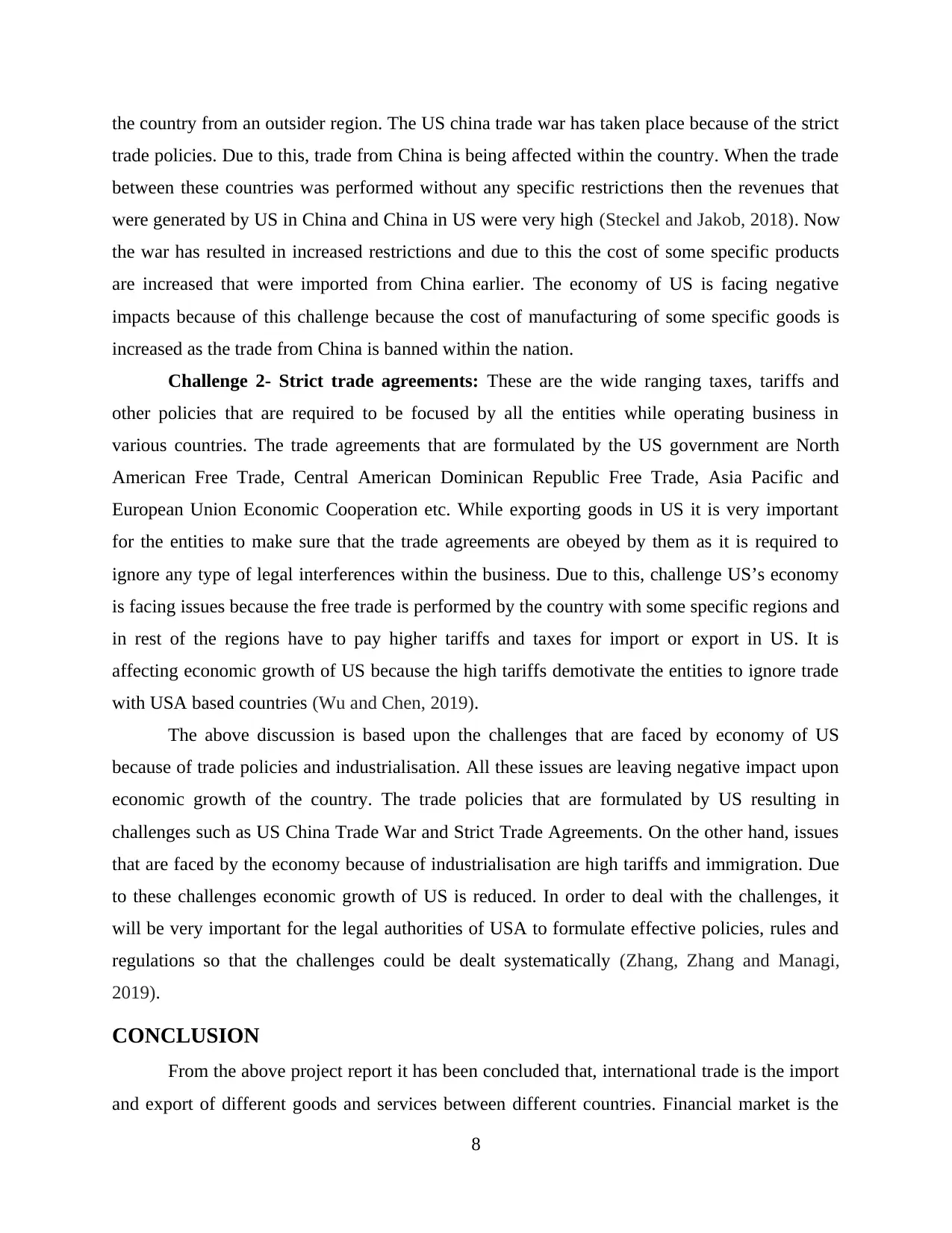
the country from an outsider region. The US china trade war has taken place because of the strict
trade policies. Due to this, trade from China is being affected within the country. When the trade
between these countries was performed without any specific restrictions then the revenues that
were generated by US in China and China in US were very high (Steckel and Jakob, 2018). Now
the war has resulted in increased restrictions and due to this the cost of some specific products
are increased that were imported from China earlier. The economy of US is facing negative
impacts because of this challenge because the cost of manufacturing of some specific goods is
increased as the trade from China is banned within the nation.
Challenge 2- Strict trade agreements: These are the wide ranging taxes, tariffs and
other policies that are required to be focused by all the entities while operating business in
various countries. The trade agreements that are formulated by the US government are North
American Free Trade, Central American Dominican Republic Free Trade, Asia Pacific and
European Union Economic Cooperation etc. While exporting goods in US it is very important
for the entities to make sure that the trade agreements are obeyed by them as it is required to
ignore any type of legal interferences within the business. Due to this, challenge US’s economy
is facing issues because the free trade is performed by the country with some specific regions and
in rest of the regions have to pay higher tariffs and taxes for import or export in US. It is
affecting economic growth of US because the high tariffs demotivate the entities to ignore trade
with USA based countries (Wu and Chen, 2019).
The above discussion is based upon the challenges that are faced by economy of US
because of trade policies and industrialisation. All these issues are leaving negative impact upon
economic growth of the country. The trade policies that are formulated by US resulting in
challenges such as US China Trade War and Strict Trade Agreements. On the other hand, issues
that are faced by the economy because of industrialisation are high tariffs and immigration. Due
to these challenges economic growth of US is reduced. In order to deal with the challenges, it
will be very important for the legal authorities of USA to formulate effective policies, rules and
regulations so that the challenges could be dealt systematically (Zhang, Zhang and Managi,
2019).
CONCLUSION
From the above project report it has been concluded that, international trade is the import
and export of different goods and services between different countries. Financial market is the
8
trade policies. Due to this, trade from China is being affected within the country. When the trade
between these countries was performed without any specific restrictions then the revenues that
were generated by US in China and China in US were very high (Steckel and Jakob, 2018). Now
the war has resulted in increased restrictions and due to this the cost of some specific products
are increased that were imported from China earlier. The economy of US is facing negative
impacts because of this challenge because the cost of manufacturing of some specific goods is
increased as the trade from China is banned within the nation.
Challenge 2- Strict trade agreements: These are the wide ranging taxes, tariffs and
other policies that are required to be focused by all the entities while operating business in
various countries. The trade agreements that are formulated by the US government are North
American Free Trade, Central American Dominican Republic Free Trade, Asia Pacific and
European Union Economic Cooperation etc. While exporting goods in US it is very important
for the entities to make sure that the trade agreements are obeyed by them as it is required to
ignore any type of legal interferences within the business. Due to this, challenge US’s economy
is facing issues because the free trade is performed by the country with some specific regions and
in rest of the regions have to pay higher tariffs and taxes for import or export in US. It is
affecting economic growth of US because the high tariffs demotivate the entities to ignore trade
with USA based countries (Wu and Chen, 2019).
The above discussion is based upon the challenges that are faced by economy of US
because of trade policies and industrialisation. All these issues are leaving negative impact upon
economic growth of the country. The trade policies that are formulated by US resulting in
challenges such as US China Trade War and Strict Trade Agreements. On the other hand, issues
that are faced by the economy because of industrialisation are high tariffs and immigration. Due
to these challenges economic growth of US is reduced. In order to deal with the challenges, it
will be very important for the legal authorities of USA to formulate effective policies, rules and
regulations so that the challenges could be dealt systematically (Zhang, Zhang and Managi,
2019).
CONCLUSION
From the above project report it has been concluded that, international trade is the import
and export of different goods and services between different countries. Financial market is the
8
Paraphrase This Document
Need a fresh take? Get an instant paraphrase of this document with our AI Paraphraser
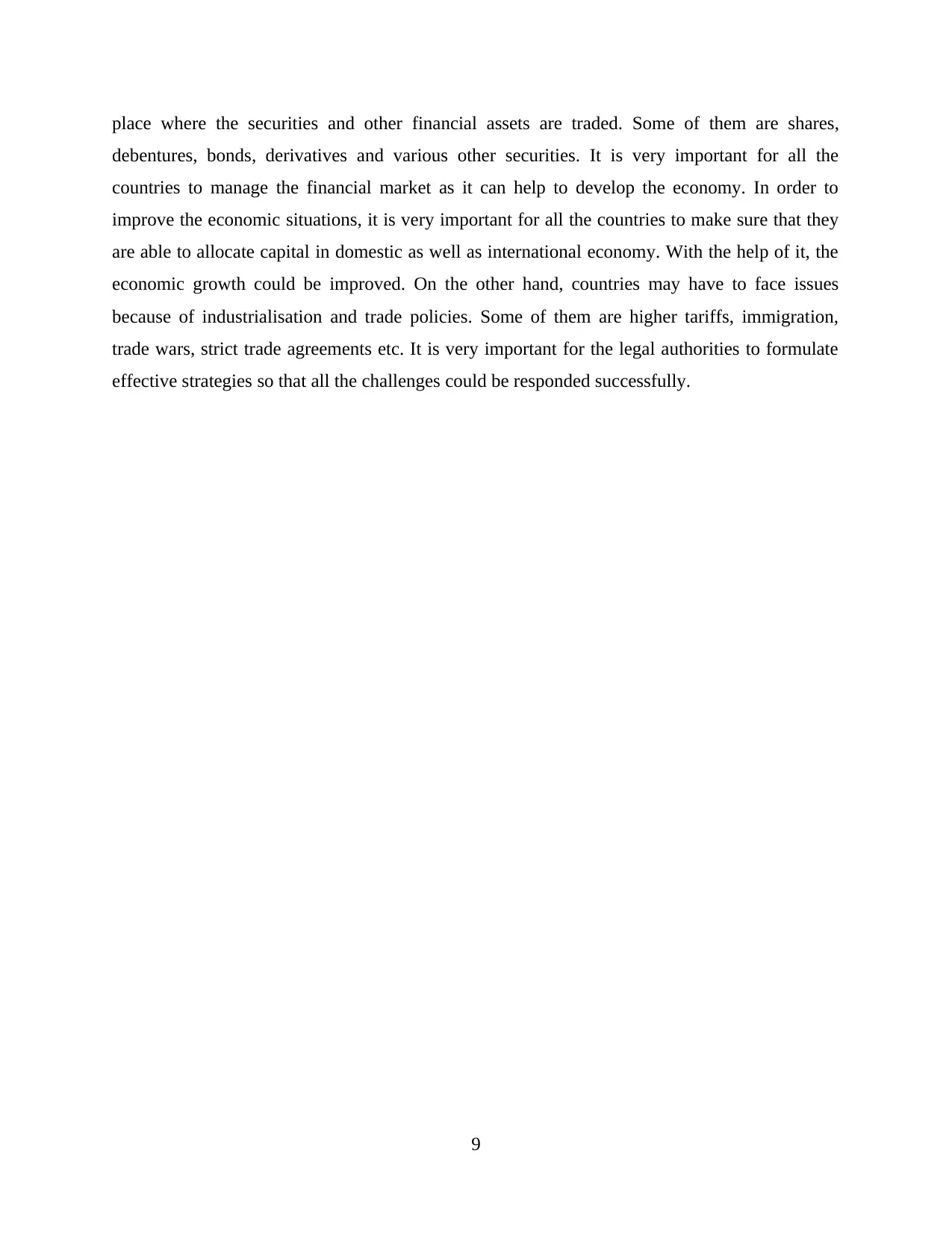
place where the securities and other financial assets are traded. Some of them are shares,
debentures, bonds, derivatives and various other securities. It is very important for all the
countries to manage the financial market as it can help to develop the economy. In order to
improve the economic situations, it is very important for all the countries to make sure that they
are able to allocate capital in domestic as well as international economy. With the help of it, the
economic growth could be improved. On the other hand, countries may have to face issues
because of industrialisation and trade policies. Some of them are higher tariffs, immigration,
trade wars, strict trade agreements etc. It is very important for the legal authorities to formulate
effective strategies so that all the challenges could be responded successfully.
9
debentures, bonds, derivatives and various other securities. It is very important for all the
countries to manage the financial market as it can help to develop the economy. In order to
improve the economic situations, it is very important for all the countries to make sure that they
are able to allocate capital in domestic as well as international economy. With the help of it, the
economic growth could be improved. On the other hand, countries may have to face issues
because of industrialisation and trade policies. Some of them are higher tariffs, immigration,
trade wars, strict trade agreements etc. It is very important for the legal authorities to formulate
effective strategies so that all the challenges could be responded successfully.
9
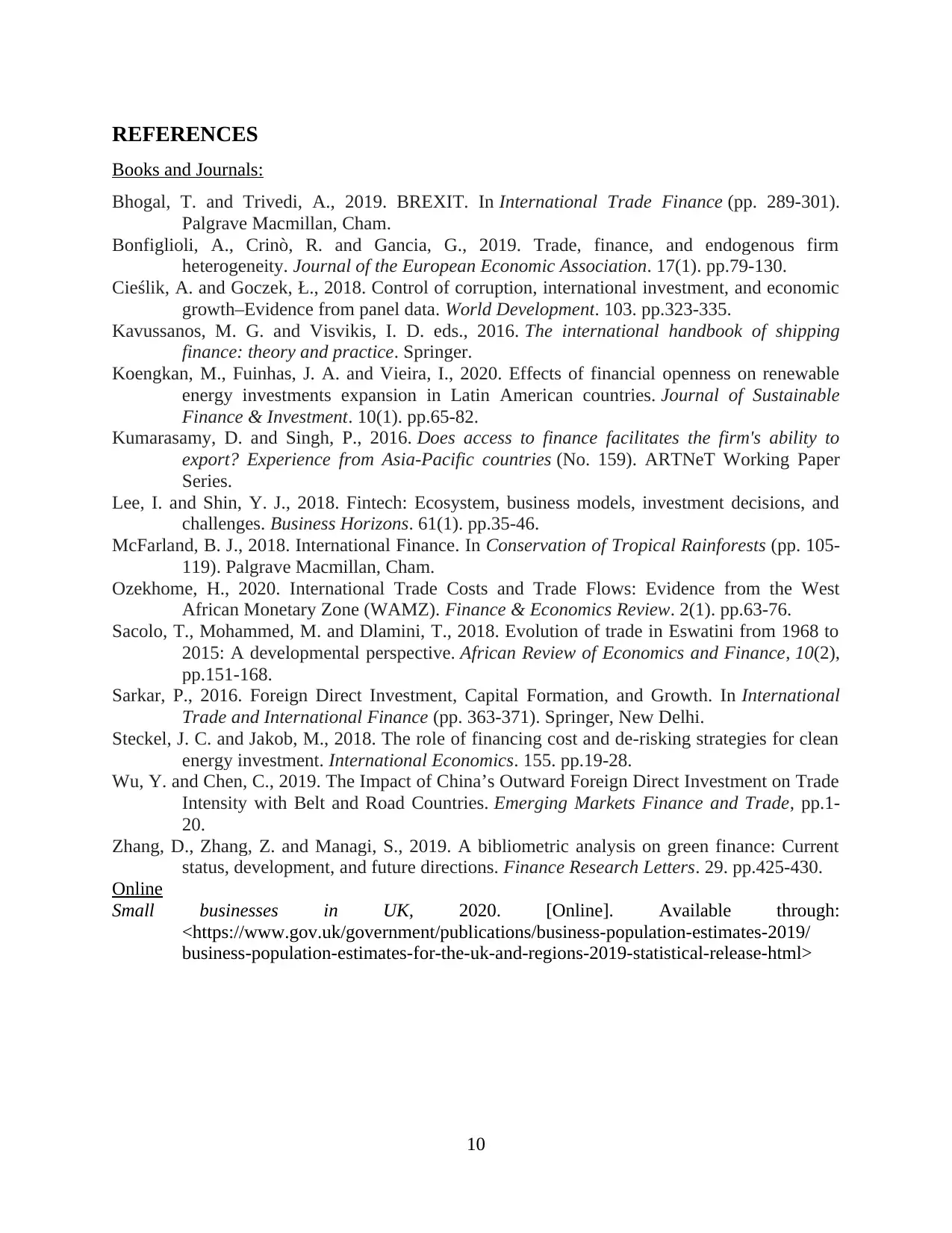
REFERENCES
Books and Journals:
Bhogal, T. and Trivedi, A., 2019. BREXIT. In International Trade Finance (pp. 289-301).
Palgrave Macmillan, Cham.
Bonfiglioli, A., Crinò, R. and Gancia, G., 2019. Trade, finance, and endogenous firm
heterogeneity. Journal of the European Economic Association. 17(1). pp.79-130.
Cieślik, A. and Goczek, Ł., 2018. Control of corruption, international investment, and economic
growth–Evidence from panel data. World Development. 103. pp.323-335.
Kavussanos, M. G. and Visvikis, I. D. eds., 2016. The international handbook of shipping
finance: theory and practice. Springer.
Koengkan, M., Fuinhas, J. A. and Vieira, I., 2020. Effects of financial openness on renewable
energy investments expansion in Latin American countries. Journal of Sustainable
Finance & Investment. 10(1). pp.65-82.
Kumarasamy, D. and Singh, P., 2016. Does access to finance facilitates the firm's ability to
export? Experience from Asia-Pacific countries (No. 159). ARTNeT Working Paper
Series.
Lee, I. and Shin, Y. J., 2018. Fintech: Ecosystem, business models, investment decisions, and
challenges. Business Horizons. 61(1). pp.35-46.
McFarland, B. J., 2018. International Finance. In Conservation of Tropical Rainforests (pp. 105-
119). Palgrave Macmillan, Cham.
Ozekhome, H., 2020. International Trade Costs and Trade Flows: Evidence from the West
African Monetary Zone (WAMZ). Finance & Economics Review. 2(1). pp.63-76.
Sacolo, T., Mohammed, M. and Dlamini, T., 2018. Evolution of trade in Eswatini from 1968 to
2015: A developmental perspective. African Review of Economics and Finance, 10(2),
pp.151-168.
Sarkar, P., 2016. Foreign Direct Investment, Capital Formation, and Growth. In International
Trade and International Finance (pp. 363-371). Springer, New Delhi.
Steckel, J. C. and Jakob, M., 2018. The role of financing cost and de-risking strategies for clean
energy investment. International Economics. 155. pp.19-28.
Wu, Y. and Chen, C., 2019. The Impact of China’s Outward Foreign Direct Investment on Trade
Intensity with Belt and Road Countries. Emerging Markets Finance and Trade, pp.1-
20.
Zhang, D., Zhang, Z. and Managi, S., 2019. A bibliometric analysis on green finance: Current
status, development, and future directions. Finance Research Letters. 29. pp.425-430.
Online
Small businesses in UK, 2020. [Online]. Available through:
<https://www.gov.uk/government/publications/business-population-estimates-2019/
business-population-estimates-for-the-uk-and-regions-2019-statistical-release-html>
10
Books and Journals:
Bhogal, T. and Trivedi, A., 2019. BREXIT. In International Trade Finance (pp. 289-301).
Palgrave Macmillan, Cham.
Bonfiglioli, A., Crinò, R. and Gancia, G., 2019. Trade, finance, and endogenous firm
heterogeneity. Journal of the European Economic Association. 17(1). pp.79-130.
Cieślik, A. and Goczek, Ł., 2018. Control of corruption, international investment, and economic
growth–Evidence from panel data. World Development. 103. pp.323-335.
Kavussanos, M. G. and Visvikis, I. D. eds., 2016. The international handbook of shipping
finance: theory and practice. Springer.
Koengkan, M., Fuinhas, J. A. and Vieira, I., 2020. Effects of financial openness on renewable
energy investments expansion in Latin American countries. Journal of Sustainable
Finance & Investment. 10(1). pp.65-82.
Kumarasamy, D. and Singh, P., 2016. Does access to finance facilitates the firm's ability to
export? Experience from Asia-Pacific countries (No. 159). ARTNeT Working Paper
Series.
Lee, I. and Shin, Y. J., 2018. Fintech: Ecosystem, business models, investment decisions, and
challenges. Business Horizons. 61(1). pp.35-46.
McFarland, B. J., 2018. International Finance. In Conservation of Tropical Rainforests (pp. 105-
119). Palgrave Macmillan, Cham.
Ozekhome, H., 2020. International Trade Costs and Trade Flows: Evidence from the West
African Monetary Zone (WAMZ). Finance & Economics Review. 2(1). pp.63-76.
Sacolo, T., Mohammed, M. and Dlamini, T., 2018. Evolution of trade in Eswatini from 1968 to
2015: A developmental perspective. African Review of Economics and Finance, 10(2),
pp.151-168.
Sarkar, P., 2016. Foreign Direct Investment, Capital Formation, and Growth. In International
Trade and International Finance (pp. 363-371). Springer, New Delhi.
Steckel, J. C. and Jakob, M., 2018. The role of financing cost and de-risking strategies for clean
energy investment. International Economics. 155. pp.19-28.
Wu, Y. and Chen, C., 2019. The Impact of China’s Outward Foreign Direct Investment on Trade
Intensity with Belt and Road Countries. Emerging Markets Finance and Trade, pp.1-
20.
Zhang, D., Zhang, Z. and Managi, S., 2019. A bibliometric analysis on green finance: Current
status, development, and future directions. Finance Research Letters. 29. pp.425-430.
Online
Small businesses in UK, 2020. [Online]. Available through:
<https://www.gov.uk/government/publications/business-population-estimates-2019/
business-population-estimates-for-the-uk-and-regions-2019-statistical-release-html>
10
⊘ This is a preview!⊘
Do you want full access?
Subscribe today to unlock all pages.

Trusted by 1+ million students worldwide
1 out of 12
Related Documents
Your All-in-One AI-Powered Toolkit for Academic Success.
+13062052269
info@desklib.com
Available 24*7 on WhatsApp / Email
![[object Object]](/_next/static/media/star-bottom.7253800d.svg)
Unlock your academic potential
Copyright © 2020–2026 A2Z Services. All Rights Reserved. Developed and managed by ZUCOL.





